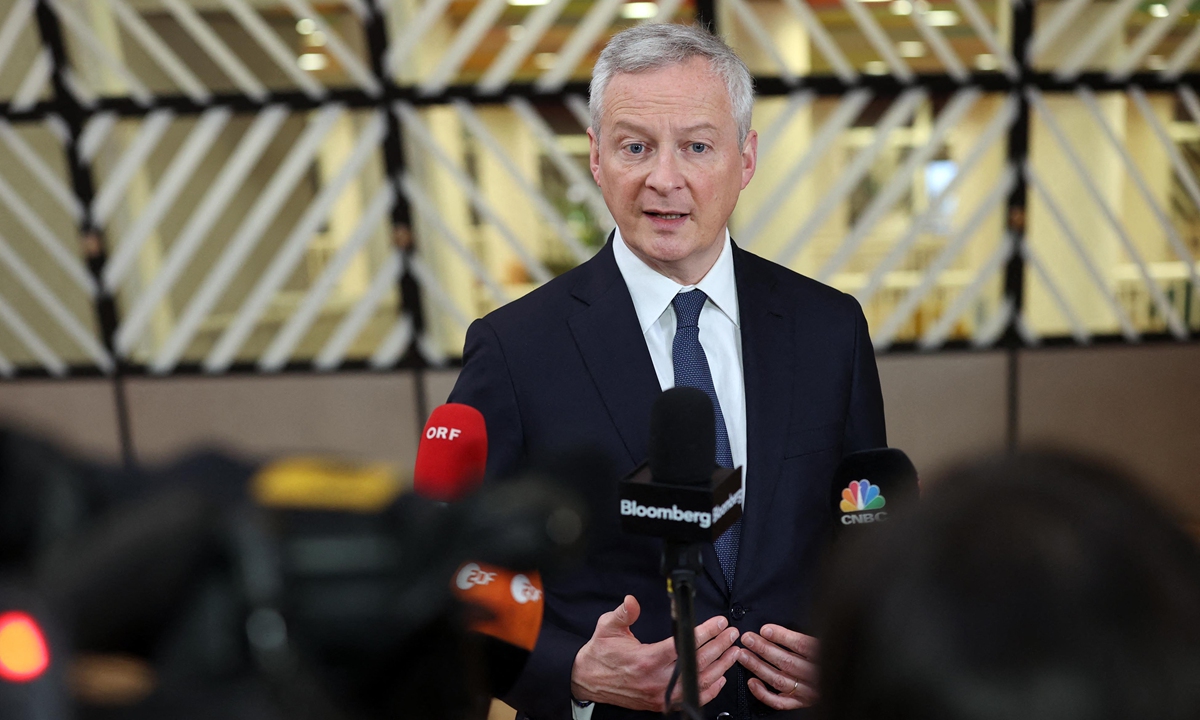
Bruno Le Maire, French Minister of Economy and Finance, talks to press before the Economic and Financial Affairs Council (ECOFIN) meeting in Brussels, Belgium on March 15, 2022. Ministers are scheduled to discuss the economic and financial consequences of the sanctions imposed on Russia over Ukraine crisis. Photo: AFP
Following in the steps of the US and Japan, the EU moved to revoke Russia's "most-favored nation" (MFN) trade status under the WTO framework, which experts called a "middle ground choice" between halting trade with Russia and stopping the pace of sanctions, as the EU and its allies hope to isolate Russia from the global economic system, but fear this may backfire on its own economy as the region's trade is closely intertwined with Russian supplies.
Experts said the effects of such a policy would be strategic over the longer term, as they will gradually erode Russia's trade with Western countries, but the EU's economy will also suffer shockwaves, such as rising inflation, they said.
The revocation, disclosed by the French EU presidency on Twitter on Monday, is believed to pave the way for further punitive measures, such as imposing higher tariffs on certain Russian goods, according to a Reuters report.
Specifically, sanctions are set to include an import ban on Russian steel and iron, an export ban on luxury goods including cars worth more than 50,000 euros ($55,000), and a ban on investments in oil companies or the energy sector, Reuters cited sources as saying.
Last week, the G7 group of wealthy nations including the US, UK and Japan made a similar announcement of revoking Russia's MFN status.
Under the MFN status, WTO member countries benefit from the same baseline duties from each other when their companies trade in goods and services.
In response to "an unprecedented set of sanctions," Russia announced on Tuesday reciprocal measures against 13 US politicians and celebrities, including US President Joe Biden and Secretary of State Antony Blinken, the Russian Foreign Ministry said.
Russia's "entry ban list" was an inevitable result of the extreme anti-Russian line taken by the US side, which is desperate to contain Russia and to maintain its hegemony, it said.
The ministry also said that Russia would not boycott official contacts and, if it is in Russia's national interest, Moscow will go through the necessary procedures to arrange high-level contacts with the US.
The EU's move to revoke Russia's MFN status follows previous rounds of sanctions. From freezing Russian banks' assets and restricting trade of Russian crude oil and coal, Western countries have taken systematic sanctions against Russia, with a phased goal of damaging normal trade relations between Russia and the related countries, experts said.
"Once Russia is stripped off MFN status, the US and Europe will kick off more legal procedures to increase punitive tariffs on Russian products, in a bid to further weaken Russia's economic strength," Chen Jia, a research fellow with the International Monetary Institute of the Renmin University of China, told the Global Times on Tuesday, noting that Russian products ranging from seafood and wine to diamonds might be either banned or face high tariffs.
The sanctions also reflect a kind of paradox faced by Europe, as the region is struggling to strike a balance between stopping its pace of sanctioning Russia, which the US won't allow, or using very drastic sanctions, like halting Russian imports completely, which its economy can't stand, due to the level of reliance it has now on Russian energy supplies, experts said.
"Because of the EU's reliance on Russian energy, it tried to avoid too harsh sanction measures like a trade ban, which would not only cause supply problems for many member countries in the EU, but may also trigger protests from the ordinary people or the commercial circle," Cui Hongjian, director of the Department of European Studies at the China Institute of International Studies, told the Global Times on Tuesday.
Using the MFN sanctions, the EU is looking to increase the trade costs for Russia, which would gradually decrease the flow of Russian products into Europe. "It is not a trade ban, but could be seen as a kind of prelude to a trade ban, as it would lead to market adjustment for less Russia-EU trade over some time," he said.
The consequences of such policies will of course be suffered by both Russia and the EU, experts said, with Russia's global industrial chain being disrupted and foreign currencies slumping, while the EU and the US have to endure higher inflation after imposing higher tariffs on products imported from Russia.
"The sanctions will hurt the interests of ordinary Americans and Europeans with a spike in global energy prices and devastating hyperinflation," Chen said.
Some economists believed that the adverse impact of this sanction will be even stronger on Europe than on Russia, as energy trade, which accounts for most of Russia's exports to EU, was de facto excluded from WTO regulations. Therefore the removal of Russia's MFN status will not have a great impact on Russian's energy exports, an observer in international relations told the Global Times on condition of anonymity.
"The exports of the EU and Japan to Russia are manufactured goods, which are subject to MFN treatment. If Russia takes countermeasures to raise tariffs on these products from the EU and Japan, it will cause a bigger impact for them rather than what they did to Russia," he said.
Bai Ming, a deputy director of the International Market Research Institute at the Chinese Academy of International Trade and Economic Cooperation, told the Global Times that it's very likely that the EU will soon draft a list of Russian products that will be subject to higher tariffs.
He also said that energy should be excluded from the list, as Europe would "shoot itself in the foot" by increasing the import cost of Russian energy, which it still needs in large quantities, at least for the time being.




